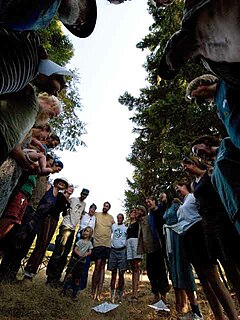
Systems engineering is an interdisciplinary field of engineering and engineering management that focuses on how to design and manage complex systems over their life cycles. At its core, systems engineering utilizes systems thinking principles to organize this body of knowledge. The individual outcome of such efforts, an engineered system, can be defined as a combination of components that work in synergy to collectively perform a useful function.
The Merriam-Webster dictionary defines system analysis as "the process of studying a procedure or business in order to identify its goals and purposes and create systems and procedures that will achieve them in an efficient way". Another view sees system analysis as a problem-solving technique that breaks down a system into its component pieces for the purpose of the studying how well those component parts work and interact to accomplish their purpose.

An ecovillage is a traditional or intentional community with the goal of becoming more socially, culturally, economically, and ecologically sustainable. It is consciously designed through locally owned, participatory processes to regenerate and restore its social and natural environments. Most range from a population of 50 to 250 individuals, although some are smaller, and traditional ecovillages are often much larger. Larger ecovillages often exist as networks of smaller sub-communities. Some ecovillages have grown through like-minded individuals, families, or other small groups—who are not members, at least at the outset—settling on the ecovillage's periphery and participating de facto in the community.
In social choice theory, Arrow's impossibility theorem, the general possibility theorem or Arrow's paradox is an impossibility theorem stating that when voters have three or more distinct alternatives (options), no ranked voting electoral system can convert the ranked preferences of individuals into a community-wide ranking while also meeting a specified set of criteria: unrestricted domain, non-dictatorship, Pareto efficiency, and independence of irrelevant alternatives. The theorem is often cited in discussions of voting theory as it is further interpreted by the Gibbard–Satterthwaite theorem. The theorem is named after economist and Nobel laureate Kenneth Arrow, who demonstrated the theorem in his doctoral thesis and popularized it in his 1951 book Social Choice and Individual Values. The original paper was titled "A Difficulty in the Concept of Social Welfare".
In parliamentary procedure, a voice vote or acclamation is a voting method in deliberative assemblies in which a group vote is taken on a topic or motion by responding orally.

An intentional community is a planned residential community designed from the start to have a high degree of social cohesion and teamwork. The members of an intentional community typically hold a common social, political, religious, or spiritual vision and often follow an alternative lifestyle. They typically share responsibilities and resources. Intentional communities include collective households, cohousing communities, coliving, ecovillages, monasteries, communes, survivalist retreats, kibbutzim, ashrams, and housing cooperatives. New members of an intentional community are generally selected by the community's existing membership, rather than by real-estate agents or land owners.
Majority rule is a decision rule that selects alternatives which have a majority, that is, more than half the votes. It is the binary decision rule used most often in influential decision-making bodies, including all the legislatures of democratic nations.
Minoritarianism or Minorityism is a neologism for a political structure or process in which a minority segment of a population has a certain degree of primacy in that entity's decision making. Minoritarianism may be contrasted with majoritarianism, but with legislative power being held or controlled by a minority group rather than the majority.
Software maintenance in software engineering is the modification of a software product after delivery to correct faults, to improve performance or other attributes.
Unanimity is agreement by all people in a given situation. Groups may consider unanimous decisions as a sign of e.g. social, political or procedural agreement, solidarity, and unity. Unanimity may be assumed explicitly after an unanimous vote or implicitly by a lack of objections. It does not necessarily mean uniformity and can sometimes be the opposite of majority in terms of outcomes.
A repeal is the removal or reversal of a law. There are two basic types of repeal, a repeal with a re-enactment of the repealed law, or a repeal without any replacement.
In parliamentary procedure, unanimous consent, also known as general consent, or in the case of the parliaments under the Westminster system, leave of the house, is a situation in which no member present objects to a proposal.

The European Union adopts legislation through a variety of legislative procedures. The procedure used for a given legislative proposal depends on the policy area in question. Most legislation needs to be proposed by the European Commission and approved by the Council of the European Union and European Parliament in order to become law.

Diana Leafe Christian is an author, former editor of Communities magazine, and nationwide speaker and workshop presenter on starting new ecovillages, on building communities, and on sustainability. She lives in an off-grid homestead at Earthaven Ecovillage in the Blue Ridge Mountains of North Carolina, U.S. She has said that living in an intentional community "is the longest, most expensive, personal growth workshop you will ever take."
Deliberative assemblies – bodies that use parliamentary procedure to arrive at decisions – use several methods of voting on motions. The regular methods of voting in such bodies are a voice vote, a rising vote, and a show of hands. Additional forms of voting include a recorded vote and balloting.
In parliamentary procedure as defined in Robert's Rules of Order, a motion is a formal proposal by a member of a deliberative assembly that the assembly take certain action.
In parliamentary procedure, a suspension of the rules allows a deliberative assembly to set aside its normal rules to do something that it could not do otherwise. However, there are rules that cannot be suspended.






